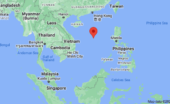Re The UN General Assembly Speaker Schedule is Here! I note that whoever will be speaking for Canada this year…
Wednesday Night #1928
Written by Diana Thebaud Nicholson // February 27, 2019 // Wednesday Nights // Comments Off on Wednesday Night #1928
Congratulations to Rachel Bendayan on her win in the Outremont by-election and to Daniel Green for the impressive bronze medal for the Green Party, ahead of the Conservative, Bloc Québécois and People’s Party of Canada contenders! As Éric Grenier says in Win, lose or draw? Byelection results suggest struggles ahead for major parties
there’s something in these byelection results for just about everyone to be happy about. There’s plenty of things there for them to worry about, too — and less than eight months left to worry about them.
We are delighted that Cleo Paskal will likely be joining us – though why she chooses to alight in Montreal during this misbegotten winter is a mystery. Her latest article is a must-read for fans of geopolitics. In China forcing a shift in strategic map she analyses how China is trying to “break out” of the three island chains that Beijing thinks constrain it.
Cleo’s visit is especially timely given recent developments in the U.S.-China trade talks. Analyses abound, however, we would particularly recommend U.S. Trade Policy in North America, China, and Beyond on the Center for American Progress.
And, of course, we welcome her astute commentary on the recent flare-up in Indian-Pakistan relations. For those who missed it, C Uday Bhaskar wrote in the South Asia Monitor some ten days ago, “At the end of the day, the long term solution to the tangled Kashmir issue lies in the socio-political domain – within J&K ; between Delhi and Srinagar ; and between India-Pakistan and China. The stance adopted by Beijing in shielding the Pakistani ‘deep state’ (read military and security establishment) in its support to both terror groups and the ideology that nurtures it has been a major obstacle and this will be an abiding challenge for Delhi irrespective of who is the next Prime Minister of India” ( Pulwama attack: Need for a radical review of internal security, foreign policy)
Donald Trump and Kim Jong Un are meeting in Hanoi. Experts and pundits (not always the same thing) have varied predictions of possible outcomes. Susan Rice, in a NYT op-ed writes: “To maximize the prospects for success, as in the Iran negotiations, the United States needs China, Russia, Japan and South Korea to join in overseeing implementation of any interim deal. … Though the Trump administration reflexively scorns multilateral efforts, North Korea is yet another case where going it alone won’t suffice. In Hanoi, Mr. Trump has an opportunity to achieve incremental progress toward denuclearization. Unfortunately, history suggests that Mr. Trump will be content with another colorful photo opportunity and more diplomatic shadow boxing that perpetuates the illusion of success, while running down the clock on a nearly intractable challenge.”
Jeremy Kinsman and Larry Haas weigh in on the summit between Donald Trump and Kim Jong Un, and the ongoing crisis in Venezuela.
And then there is Brexit: Monday’s news that Britain’s opposition Labour Party said that it was prepared to support a second referendum on withdrawal from the European Union had John Curtin cheering “Just when I was about to apply for an Austrian passport, saved by the Corbyn!”, however John Buchanan cautions “Not quite there yet, as this is only once their own motion on their desired Brexit is defeated…and we don’t know how many conservatives will vote for it. And we don’t know how many more times Theresa will delay or whether she will go for a short delay from the EU.”
Sure enough, on Tuesday, Prime Minister Theresa May offered MPs a binding vote to delay Brexit and avoid leaving the European Union without a deal, a dramatic change of policy designed to prevent a new wave of Cabinet resignations.
The SNC-Lavalin saga continues and we will hear from Jody Wilson-Raybould. Now that the PM has graciously waived, by Order in Council, the cabinet confidence, solicitor-client privilege, she is appearing before the Commons Justice Committee on Wednesday. How much we learn is moot, as she has written that “The OIC addresses only my time as attorney general of Canada and therefore does nothing to release me from any restrictions that apply to communications while I served as minister of veterans affairs and in relation to my resignation from that post or my presentation to cabinet after I had resigned.”
If all of this is not sufficient excitement, there is always the Mueller probe. As Donald Trump looks over his shoulder from Hanoi, Politico asserts Trump’s inner circle might escape Mueller charges — but still won’t be safe Federal prosecutors and Democratic committees are just getting started
We have recently been introduced to CapX which publishes some interesting articles one does not see elsewhere. CapX was founded to make the case for popular capitalism: now more than ever, it is vital that the case is made for markets, innovation and competition, and for policies that deliver for the masses as well as the elites. It is owned and produced by the Centre for Policy Studies Worth bookmarking.
Lighter moments:
Canada Tests Cloaking Device
In a nationwide exercise that the strange band of far-northerners that call themselves Canucks never seem to tire of, Canada today deployed their state-of-the-art cloaking device – disappearing from the prying eyes of an increasingly aggressive world behind a whirling blanket of white and cold that they call “Scattered Flurries”.
“We are still here, and can hear you,” confirmed Environment Canada, to the bemused outside world” … “This is just a test of our national invisibility device, and is separate from our international invisibility device, which actually [is] just a function of our foreign policy.”
Sebastian Marx est un comique américain expatrié qui vit à Paris et qui joue du stand up en français et en anglais. And he is brilliant!
Si tu as du mal à prononcer la langue française, ce n’est pas ta faute. C’est la faute de la langue française !
Good reads
The Real Reason They Hate Nuclear Is Because It Means We Don’t Need Renewables
In reality, solar farms require hundreds of times more land, an order of magnitude more mining for materials, and create hundreds of times more waste, than do nuclear plants.
And wind farms kill hundreds of thousands of threatened and endangered birds, may make the hoary bat go extinct, and kill more people than nuclear plants.
But because of our positive feelings toward sunlight, water and wind, which we view as more natural than uranium, many people unconsciously assume renewables are better for the environment.
Hayek Saw This Coming
The Austrian-born economist and classical liberal, who played such a central role in the emergence of American free market conservativism, had a keen understanding of the temptations of authoritarianism. That’s what makes his warnings seem so prescient.
“’Emergencies’ have always been the pretext on which the safeguards of individual liberty have been eroded,” he wrote.
Hayek’s chapter on “Why the Worst Get on Top” in his classic work, The Road to Serfdom, diagnosed the populist impulse that would lead to the demand for ceding power to a “man of action.” This is “the position which precedes the suppression of democratic institutions and the creation of a totalitarian regime.”
Is the “Populist” Tide Retreating?
By Joseph S. Nye
Strong support for immigration and globalization in the US sits uneasily with the view that “populism” is a problem. In fact, the term remains vague and explains too little – particularly now, when support for the political forces it attempts to describe seems to be on the wane.
The Decline of Historical Thinking
Having ignored questions of economic inequality for decades, economists and other scholars have recently discovered a panoply of effects that go well beyond the fact that some people have too much money and many don’t have enough. Inequality affects our physical and mental health, our ability to get along with one another and to make our voices heard and our political system accountable, and, of course, the futures that we can offer our children. Lately, I’ve noticed a feature of economic inequality that has not received the attention it deserves. I call it “intellectual inequality.”
Ruth Bader Ginsburg’s 1950s marriage was more equal than most modern ones



